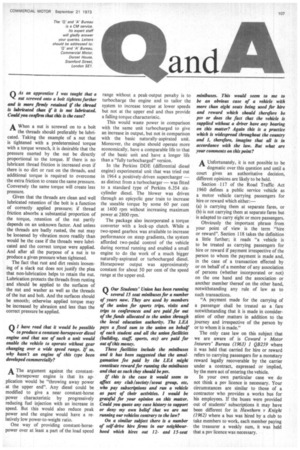Q As an apprentice I was taught that a nut screwed
Page 109

If you've noticed an error in this article please click here to report it so we can fix it.
onto a bolt tightens further and is more firmly retained V the thread is lubricated than V it is not lubricated. Could you confirm that this is the case?
A When a nut is screwed on to a bolt
the threads should preferably be lubricated. Taking the example of a nut that is tightened with a predetermined torque with a torque wrench, it is desirable that the pressure exerted by the nut be directly proportional to the torque. If there is no lubricant thread friction is increased even if there is no dirt or rust on the threads, and additional torque is required to overcome the extra friction to create the same pressure. Conversely the same torque will create less pressure.
Given that the threads are clean and well lubricated retention of the bolt is a function of correctly applied pressure; if thread friction absorbs a substantial proportion of the torque, retention of the nut partly depends on an unknown factor. And unless the threads are badly rusted, the nut may be loosened by vibration more readily than would be the case if the threads were lubricated and the correct torque were applied. And after all the purpose of a nut is to produce a given pressure when tightened.
The fact that rust and dirt resists loosening of a slack nut does not justify the plea that non-lubrication helps to retain the nut. Lubrication protects the threads from rusting and should be applied to the surfaces of the nut and washer as well as the threads of the nut and bolt. And the surfaces should be smooth; otherwise applied torque may be increased by abrasion and less than the correct pressure be applied.
















































































































































































